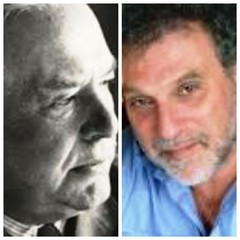|
Back
Musical Concert, Musically Disconcerting New York
92nd Steet Y, Theresa L. Kaufmann Concert Hall
03/09/2019 -
92Y: Inflection Music Art Literature Series: Meditations on Wallace Stevens:
Martin Bresnick: String Quartet No. 4 “The Planet on the Table” (New York Premiere)
Ludwig van Beethoven: String Quartet No. 15 in A Minor, Opus 132
Brentano String Quartet: Mark Steinberg (Violin, Program Annotator), Serena Canin (Violin), Misha Amory (Viola), Nina Lee (Cello)
Fred Child (Reader)

W. Stevens/M. Bresnick
“The garden flew round with the angel,/The angel flew round with the clouds,/And the clouds flew round and the clouds flew round/And the clouds flew round with the clouds.../
“Mrs. Anderson’s Swedish baby/Might well have been German or Spanish/Yet that things go round and again go round/Has rather a classical sound.”
Wallace Stevens, from The Pleasures Of Merely Circulating, as preface to Harry Rolnick’s Feng Shui and First Movement of Martin Bresnick’s String Quartet No. 4
Wallace Stevens is quoted by everybody, but understood by few. A composer can be understood “not by sound but by feeling” (another Stevens phrase). A poet’s words may give the illusion of simplicity, but, in Stevens’ case, it is a sacrosanct calling. He is atheistic, anti-clerical, but like the later Roman philosophers, he felt that his faith in poetry–in fact, in the vatic sanctity of words–was faith enough.
And thereby lies the problem of the 92Y “Inflection” series. Not a fatal problem at all. The Brentano String Quartet is strong, singular, not idiosyncratic yet with a dynamic which makes everything stand out. Martin Bresnick is not a household name like his Yale colleague David Lang. Yet each time I’ve heard his music, its originality and structure have stunned me. Fred Childs is a well-known voice for those who hear WQXR, so his readings of Wallace Stevens were more than adequate.
Then again, whether one understands Stevens or not, he is the most musical of poets. So musical that I don’t know any composer who would try to set his poems to music.
Without torturing the point, this was the paradox. The poetry of Wallace Stevens can be altered into music the way Mr. Bresnick did, so long as one is not reading the words. The inspirations for the composer’s five-movement Fourth String Quartet came from Stevens’ poetry, and perhaps should have been read prior to the performance. So the advantage was that it didn’t interfere with the work. The music spoke for itself.
Like Stevens, Mr. Bresnick gives the illusion of writing about material things. He has written about Kafka’s mouse and Alexander’s horse. He has transported an ideological Brecht poem about Bucephalus not with singing, but chamber music. He wrote about a visit to his ancestors’ home in Belarus with simple Dvorák-style reminiscent music. And in all his non-vocal music, he stands apart from the words, but allows words to be a cathartic inspiration.
I am guilty of not having read the Stevens prefaces to each movement. Though that may have helped, I was still intrigued with the pure musical elements. The congruity of each instrument playing on one note but spreading out. Nina Lee’s cello plucking out a few notes chaconne style, the other instruments blending into or standing apart. The sounds of a Vivaldi-style thunderstorm (I guess that was for Stevens’ “There is lightning and the thickest thunder, it is a spectacle”).

Brentano String Quartet (© Courtesy of the Artists)
Mr. Bresnick never uses dissonance for its own sake. His music is not simple, yet its facility, whether discordant or not, is its own pleasure. And this String Quartet, played with a consciousness and note-by-note appreciation by the Brentano quartet, was as much a treat as the poetry itself.
After this, Fred Childs then came on stage, and read some poems by Wallace Stevens. He was good, professional, yet the stage seemed somewhat barren without the four players.
Next came the problem. Beethoven’s very classical-styled Fifteenth Quartet, which demands highly conscious listening, was disrupted, chopped up by verses of Wallace Stevens strung along the background screen. The words were eloquent, but Beethoven’s notes were graphic in a different way.
For the latter, one needed ears and feelings. We didn’t need the links, since Beethoven supplied logic from his own inner mind. The poetry demanded appreciation (“Gee, that’s a nice phrase”) and understanding (“Good words, but I wonder what he meant by that”). And, as least to this listener it was literally disconcerting.
By the second movement, I could not be distracted any further, and let my head bow. Stevens, who loved Beethoven, would have been entertained. Beethoven, who lived in a generation of Goethe and Schiller, would have said to himself, “If I wanted to write poetry, I would write poetry, not music.” To an audience he would shout, “You came here for my music! Stop reading those Scheiße Worten on the screen.”
Old Lud wouldn’t have looked at the poetry, he would have heard only the music. We had a choice. I chose the notes, not the words, and later, in the silence of my home went back to the poetry.
Anyhow the next “Inflection” concert, on Tuesday, headlines Gidon Kremer and a film featuring the stone sculptures of Nizar Ali Badr. If 92Y allows me to return, I shall be there.
Harry Rolnick
|